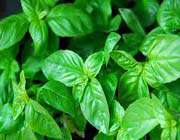Sweet Benefits of Basil

Basil is a common herb in most of our kitchens, but did you know that, besides tasting good in our chicken and pasta dishes, it can be of use toward having more healthy bodies? It is an excellent alternative health treatment for many minor ailments.
Grown originally in Asia and the Middle East, basil travelled the world along the spice trail. It has been grown and used for 5000 years and has hundreds of varieties and is now cultivated in many countries. All of its varieties have unique and individual chemical make-ups; and yet the base medicinal properties remain consistent from one strain to another.
Cardiovascular Benefits
Basil is rich in carotenoids such as beta-carotene, which can be converted into vitamin A. Beta-carotene is an even more potent antioxidant than regular vitamin A, as it not only protects cells from free radical damage, but also aids in keeping free radicals from oxidizing cholesterol in the bloodstream. By not oxidizing, cholesterol does not build up on blood vessel walls, avoiding atherosclerosis and a heart attack. Basil is also a good source of magnesium, which promotes cardiovascular health by relaxing muscles and blood vessels, improving blood flow and lowering the risk of irregular heart rhythms and cardiovascular spasms.
Cancer Prevention
Basil is known to have powerful antioxidant properties. The natural antioxidants found in basil can protect the body against damage from free radicals, thereby combating most forms of cancer. Basil also contains flavonoids, which protect cell structures from radiation and oxygen-based damage. Basil is a rich source of beta-carotene, which helps protect cells from free radical damage.
Skin and Hair Health
When used as a skin and hair moisturizer, the essential oils of basil enhance the luster of dull looking skin and hair. Basil is also effective in treating acne and psoriasis.
Bone and Connective Tissue
The essential oil of basil contains a liquid called eugenol, which can inhibit the activity of cyclooxygenase, an enzyme which causes swelling in joints and bones among other places. Aspirin and ibuprofen work by blocking the same enzyme. This enzyme-inhibiting power makes basil an anti-inflammatory food that can heal and give relief for people with rheumatoid arthritis.
Digestive Tract Health
The enzyme-inhibiting effect of the eugenol in basil certifies basil as an anti-inflammatory food providing important healing benefits as well as relief from inflammatory bowel conditions. It can also provide immediate relief from the gas in your stomach and intestines, treat constipation, stomach cramps, indigestion and flatulence.
Kidney Stone
Basil has strengthening effect on the kidney. In case of renal stone the juice of basil leaves and honey, if taken regularly for 6 months it will expel them via the urinary tract.
Anti-Bacterial
The essential oil of basil has been shown to provide impressive protection against unwanted bacterial growth of many types, including the ability to inhibit several species that have become resistant to commonly used antibiotic drugs. Studies have shown that washing produce in a solution containing just 1% essential oil of basil resulted in killing such bacteria, so it makes good sense to include basil in salads.
Immune System
Evidence shows that the antioxidants and volatile oils in basil make it of great assistance to the immune system. The leaves and oil both have antibacterial properties, and can even be used to eliminate infectious diseases from surfaces. Applied topically to wounds, basil leaves may eliminate bacterial infections, while enjoying basil in food can help combat viral infections, including colds, flu, and herpes.
Sore Throat
Water boiled with basil leaves can be taken as drink in case of sore throat. This water can also be used as a gargle.
Mouth Infections
The leaves are quit effective for the ulcer and infections in the mouth. A few leaves chewed will cure these conditions.
Stress
Basil leaves are regarded as an 'adaptogen' or anti-stress agent. Recent studies have shown that the leaves afford significant protection against stress. Even healthy persons can chew 12 leaves of basil, twice a day, to prevent stress. It purifies blood and helps prevent several common elements.
Insect Bites
The herb is a prophylactic or preventive and curative for insect stings or bites. A teaspoonful of the juice of the leaves is taken and is repeated after a few hours. Fresh juice must also be applied to the affected parts. A paste of fresh roots is also effective in case of bites of insects and leeches.
Headaches
Basil makes a good medicine for headache. A decoction of the leaves can be given for this disorder. Pounded leaves mixed with sandalwood paste can also be applied on the forehead for getting relief from heat, headache, and for providing coolness in general.
DISCLAIMER: These are only general guidelines as a first aid. It is always better to see a doctor depending upon the intensity of the case.
Sources:
offthegridnews.com
healthdiaries.com
hinduism.about.com
Other links:
What Are the Health Benefits of Broccoli?
Five Reasons to eat Cauliflowers